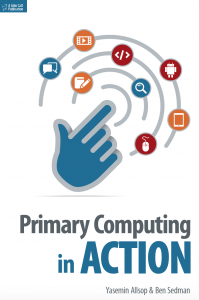This book has been written for primary teacher trainees, in service primary school teachers and teacher support staff to develop their knowledge and understanding of primary computing. The book is also useful for parents and teachers, from any country, to gain an insight into what young children learn, when working with different types of technology, from the Early Years Foundation Stage through to Key Stage 3.
EDITORS
Yasemin Allsop
Yasemin Allsop worked as an ICT Coordinator in primary schools in London for almost 10 years. She is currently employed as Senior Lecturer in Primary Computing and ICT at Roehampton University. She has MA ICT in Education from the London Knowledge Lab, University of London. She is also an MPhil/PhD student, focusing on children’s thinking, learning and metacognition when designing digital games. She published widely in quality journals and presented at conferences. She is the editor of an online magazine called ICT in Practice where educators from around the world share their experiences of using technology in education. More information can be found on her website at www.yaseminallsop.me.uk
Ben Sedman
Ben Sedman is a Senior Lecturer within the Faculty of Education at Manchester Metropolitan University. Previous to this role he taught for 7 year within the Primary sector. Ben currently teaches within the STEM Division at MMU, delivering primary D&T and Computing sessions to trainees and teachers. He has completed his MA in Education, has been involved in a European funded project and helps coordinate the Erasmus Exchange Programme. Ben is interested in a range of creative teaching approaches and enjoys photography. This is his first book. Some of his work can be viewed at www.bensedmanphotography.com
CHAPTERS & AUTHORS
1) What is computing? – Yasemin Allsop
2) Computing in the Early Years – Eleanor Hoskins
3) Tell a story and make a game –Yasemin Allsop
4) Computer science unplugged! – Alessandro Bogliolo
5) Tinkering time: Adventures in 3D designs -Selcuk Ozdemir & Ahmet Celik
6) Film, animation and podcasting: lets get creative! – Ben Sedman
7) Embedding computing in science -Maggie Morrissey
8) Linking mathematics and computing – Sue Pope
9) E-Safety and digital citizenship – Ben Sedman
10) Imagine, write and share: blogs, wikis and – Ben Sedman
11) Transition to Secondary: Mapping Your Skills – Ellie Overland
12) A brief overview of monitoring, evaluation and assessment of computing – Yasemin Allsop
13) Planning and assessment of computing and computational thinking- Mark Dorling and John Woollard
* We would like to thank Susan Adams for her contribution to Chapter 3 with an activity.















